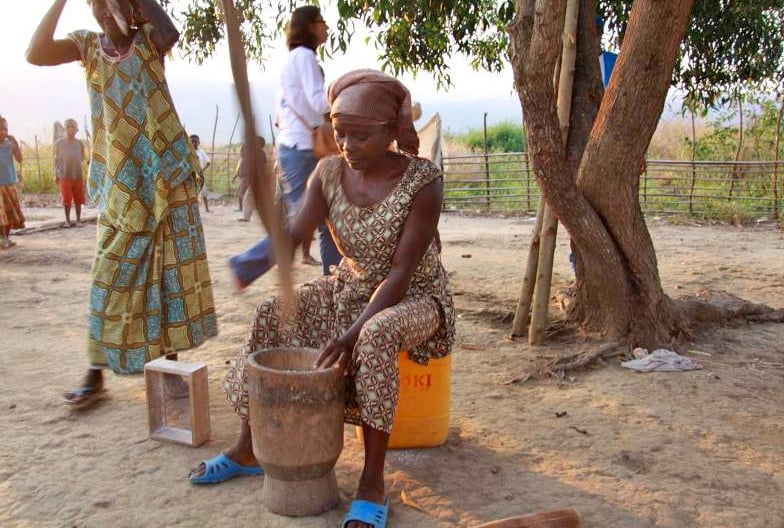In June 2012, it was determined that the circumstances - created by a civil war - that led to refugee status being granted to tens of thousands of Angolans were no longer in place. Under the terms of the 1951 Convention Relating to the Status of Refugees, this means that there is no longer a prima facie case for international protection. In short, the refugee status of these Angolans was revoked.
Individuals are still able to make a fresh application for refugee status based on their specific protection concerns.
Recognizing that local integration is one of the recognized “durable solutions” for refugees - the others being voluntary repatriation and third-country resettlement - the DRC government agreed to grant permanent residency permits to all the Angolans who did not wish to return to Angola.
But the government did not manage to distribute the required 40,000 permits by the planned deadline of the end of 2012, so many of the Angolans now lack legal identity documents.
"With such large numbers of Angolan refugees still dispersed across DR Congo provinces, it will take some time for all former refugees to be issued with resident permits," Stefano Severe, UNHCR's regional coordinator, told IRIN in Kinshasa.
"So far we have assisted the DR Congo government in funding over 6,500 permits, which have been printed and will be distributed during this January... Local authorities are well aware that this is still ongoing, and the National Refugee Commission is represented in all provinces," he said.
Waiting
Many of the former refugees are from Angola's oil- and mineral-rich northern exclave of Cabinda, which has experienced a long-running conflict that pits the government against secessionists.
"We welcomed the end of our refugee status with sadness. I'm worried to live at the moment without any status, not knowing who will protect me and my family. We were told that we could receive asylum-seekers' status by the host country's authorities. So far, we've got nothing," said one former refugee, who preferred anonymity.
"Today I can be arrested and be labelled as one of the gangsters in Kinshasa known as 'Kuluna' and won't have anyone to defend me."
Some 23,000 Angolans returned home under a repatriation programme UNHCR carried out in 2012 - the fourth since the Angolan civil war ended in 2002 - before the June revocation of their refugee status. Another 22,000 say they are willing to go home. Most were repatriated to the Angolan mainland.
"The last repatriation was based upon agreements between Angola, the UNHCR and the host countries when it was established that Angola had regained the stability [required] and its economy was prospering, especially as the majority of its refugees had returned to their home country," said Severe.
Still fearful
Refugees from Cabinda say they continue to live in fear, and accuse Angolan security forces of entering DRC and other neighbouring countries to kidnap those believed to be linked to the province's rebel groups, some of which have been fighting for independence from Angola for decades.
"I continue to live with fear because if you have a Cabindan name, it means you are considered by Angolan authorities as a rebel. Recently a friend of mine was kidnapped when he went to trade near the DRC-Angola border," said Alfred Gomez, a 48-year-old refugee and former school teacher originally from Cabinda, now living in Kinshasa.
"In October 2011, we went into hiding for two weeks when we received information from our homeland that Angolan security agents had been deployed to western Congo to kidnap people of Cabindan origin,” he said. “We looked for safety from Congolese friends until we established that they [security agents] had returned [to Angola]."
Efforts to reach Angolan authorities were unsuccessful.
Cabindan refugees are reluctant to return home, either because they support the secessionist movement or because they fear they will be pressured to pick a side once they return.
"Some are not activists, but they are former fighters of the FLEC [Front for the Liberation of the Enclave of Cabinda, the main Cabindan secessionist group]," Jose Vase, a Cabindan journalist based in Kinshasa, told IRIN.
"Others are regular citizens who cannot go back home. This is because when they do so, they will be obliged by Angolan local authorities to make statements against rebel groups, showing also the goods things the government is doing for returnees... When they do it, they are considered as enemies [of Cabindan separatists]."
pc/kr/am/rz
This article was produced by IRIN News while it was part of the United Nations Office for the Coordination of Humanitarian Affairs. Please send queries on copyright or liability to the UN. For more information: https://shop.un.org/rights-permissions





